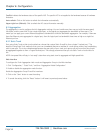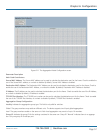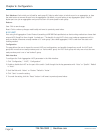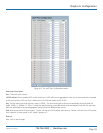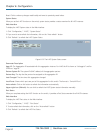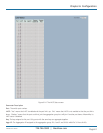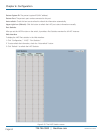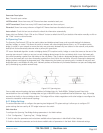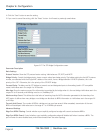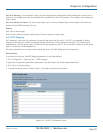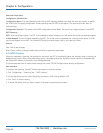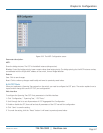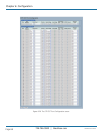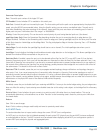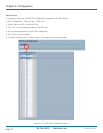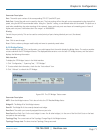
724-746-5500 | blackbox.com
Page 64
LGB5028A User‘s Manual
724-746-5500 | blackbox.com
Chapter 6: Configuration
4. Click the “Save” button to save the setting.
5 .If you want to cancel the setting, click the “Reset” button. It will revert to previously saved values.
Figure 6-17. The STP Bridge Configuration screen.
Parameter Description
Basic Settings
Protocol Version: Show the STP protocol version setting. Valid values are STP, RSTP, and MSTP.
Bridge Priority: Control the bridge priority. Lower numeric values have better priority. The bridge priority plus the MSTI instance
number, concatenated with the 6-byte MAC address of the switch, forms a Bridge Identifier. For MSTP operation, this is the
priority of the CIST. Otherwise, this is the priority of the STP/RSTP bridge.
Forward Delay: The delay used by STP bridges to transmit root and designated ports to forwarding (used in STP compatible
mode). Valid values are in the range 4 to 30 seconds.
Max Age: Show the maximum age of the information transmitted by the bridge when it is the root bridge. Valid values are in the
range of 6 to 40 seconds, and MaxAge must be <= (FwdDelay-1)*2.
Maximum Hop Count: This defines the initial value of remaining hops for MSTI information generated at the boundary of an
MSTI region. It defines how many bridges a root bridge can distribute its BPDU information to. Valid values are in the range of 6
to 40 hops.
Transmit Hold Count: The number of BPDUs a bridge port can send per second. When exceeded, transmission of the next
BPDU will be delayed. Valid values are in the range of 1 to 10 BPDUs per second.
Advanced Settings
Edge Port BPDU Filtering: Control whether a port explicitly configured as edge will transmit and receive BPDUs.
Edge Port BPDU Guard: Control whether a port explicitly configured as edge will disable itself when it receives a BPDU. The
port will enter the error-disabled state, and will be removed from the active topology.



